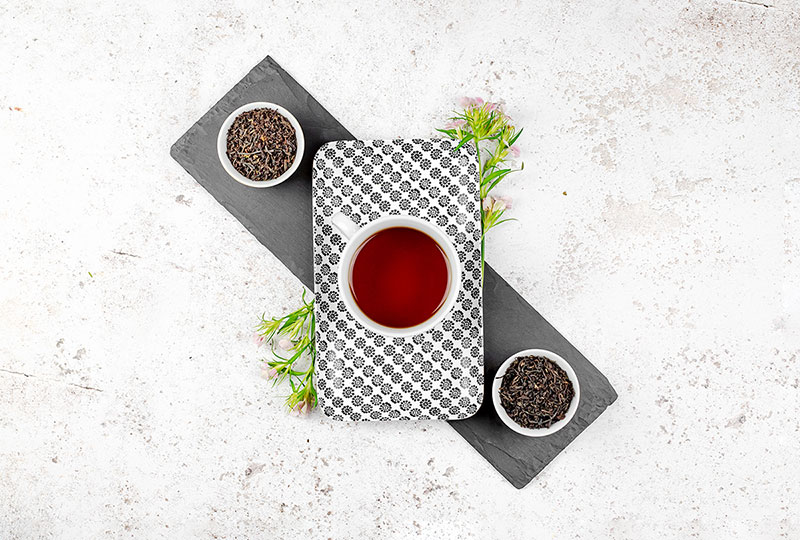Black Tea Benefits Guide
Black tea is the most consumed type of tea in the world. It’s an important part of any English breakfast, a base for a soothing Indian masala chai, and a tea that gives bergamot a chance to shine. Can it provide the same or even better benefits than green tea?
What is black tea?
Black tea is an oxidized type of tea. Just like green tea, it’s made from tea leaves of Camellia sinensis plant. However, because it undergoes different production processes, it has a different flavor, color, aroma, and chemical composition from green tea. Since both green and black tea are made from the same plant, even though the chemical composition will be altered during production, health benefits will be quite similar. Color and flavor of black tea come from polyphenols theaflavins and thearubigins [1].
Read more: Best black teas to try
The most important compounds in black tea
Tea doesn’t only have a delicious flavor, but it may be a great healthy substitute for sugary drinks. It almost calorie-free but packed with beneficial compounds. The main compounds in black tea are caffeine, polyphenols such as theaflavins, thearubigins, catechins, quercetin [2] and tannins, amino acids, minerals, vitamins, and others. The exact amount of these compounds will vary from type to type and it will depend on many factors – from tea varietal and cultivar, to growing conditions and harvesting methods, processing, storage and brewing style. If you want to maximise the benefits, pay attention to:
- Always storing your tea properly.
- Using enough tea leaves per cup of water and paying attention to the water temperature and steeping times, and re-steeping when possible.
- Buying quality teas, preferably loose leaf tea.
- Making tea drinking your daily habit.
- Drinking different types of tea.
Top Health Benefits of Black Tea
Black tea may provide a whole range of potential health benefits, including antioxidant activity, anti inflammatory activity, antibacterial activity, anticancer activity, antiviral activity and others.
Antioxidant and anti inflammatory activity comes from polyphenols, caffeine may give an energy boost and amino acids such as L-theanine may provide a calming effect. In general, black tea contains much less EGCG than green tea, but the exact amount will depend on the specific type. It’s possible for black tea to have very similar levels of EGCG to some green teas, and even more than some white teas[3].
Black tea will usually contain higher levels of caffeine, but that will also depend on the type. Some black tea like Assam may contain more caffeine than, for example, less oxidizes Darjeeling tea. Oxidation is responsible for changing catechins into therubigins and theaflavins. In fact, up to 75% of all catechins are changed to these two compounds are changed during oxidation[4].
Top health benefits of black tea are:
1. Antioxidant activity
Although green tea is usually considered the healthiest type of tea among all 6 types, this is not always true. All types of tea contain antioxidants, and the exact amounts will vary from type to type. Black tea may help boost immune system, fight free radicals and, offer one more benefits that green tea can’t provide – a metal chelating activity[5]. Theaflavins are responsible for metal chelating properties [6] and they are the most abundantly found in black tea, although other types such as white and oolong tea may contain lower amounts too.
Like to drink your tea with sugar and milk? Studies showed that adding them to your cup of black tea will not have a significant negative effect on the antioxidant activity [7].
2. Anti inflammatory activity
Studies show that black tea may help with both acute and chronic inflammation [8]. Both acute and chronic inflammation may lead to other diseases. Black tea may help with inflammatory bowel disease, gastric ulcer and inflammation, allergies, periodontal disease and osteoporosis [9].
Read more: Best teas for inflammation
3. Antibacterial activity
Black tea may provide an antibacterial activity against Gram-positive bacteria such as M. luteus. It may help with bacteria in the mouth [10] and provide benefits for oral health [11].
4. Benefits for people with Type 2 diabetes
Studies suggest that drinking black tea may help reduce the risk of developing Type 2 diabetes [12] and help patients that already developed Type 2 diabetes. It may help reduce blood sugar levels and improve the status of insulin [13], a hormone produced by pancreas.
5. Improving high blood pressure
Studies say that daily drinking of black tea may benefit heart health, help improve blood pressure, specifically hypertension and reduce the risk of stroke [14].
6. Help achieve weight loss goals
Consumption of black tea may not only help reduce body weight but also prevent fat from accumulating in the first place [15] and reduce the levels of “bad” LDL cholesterol [16]. In fact, polyphenols in black tea may actually provide better results than polyphenols in green tea [17].
7. Anticancer activity
Just like green tea, black tea too, may help in both preventing and treating cancer. Tea polyphenols may help control the growth of cancer cells [18] and help in preventing some cancers from developing in the first place [19].
8. Energy boost
Black tea may help you feel more energised, alert, and focused [20]. It contains less caffeine than coffee, but usually more than other types of tea. Black tea is usually prepared using boiling or near boiling water, which is the perfect temperature for maximizing caffeine extraction. If you want tea with the most caffeine, choose broken or CTC tea types.
9. Benefits for brain health
Studies suggest that black tea may help with some type of neurodegenerative diseases such as Parkinson’s disease and Alzheimer’s disease. More specifically, it may help prevent Parkinsons’ and help treat Alzheimer’s disease [21].
Health benefits of decaf black tea
All real teas contain caffeine, and black tea will usually contain the highest amounts. If you still want to enjoy the flavor and benefits of your favorite black tea, but want or need to reduce the caffeine intake, decaf teas may be a great alternative.
Decaf tea is tea that underwent the process of removing caffeine content from tea leaves. Black tea is the most commonly decaffeinated type of tea. Tea leaves can be decaffeinated using different processes. Some of them may reduce the amount of beneficial compounds and reduce their potential health benefits and significantly change the flavor. However, it’s not possible to determine the exact amount of antioxidants in decaf tea without testing each sample. When choosing decaf teas, the best choice could be teas that were decaffeinated using the CO2 method.
Decaf teas, if decaffeinated the right way preserving its beneficial compounds, may provide the same benefits as regular black tea. They too, will vary from type to type.
Read more: Best Decaf Teas to Try
Disclaimer: This article is for informational purposes only. It’s not intended to replace medical advice, diagnosis, or treatment. Every person is different and may react to different herbs and teas differently. Never use teas or herbs to treat serious medical conditions on your own. Always seek professional medical advice before choosing home remedies.
References:
[1] https://www.researchgate.net/publication/285945836_The_black_tea_bioactivity_An_overview
[2] https://www.researchgate.net/figure/Promising-Characteristic-of-black-tea-polyphenols_tbl2_260115837
[3] https://www.longdom.org/open-access/screening-of-epigallocatechin3gallate-egcg-content-in-camellia-sinensis-products-2329-6836-1000339.pdf
[4] https://www.researchgate.net/publication/285945836_The_black_tea_bioactivity_An_overview
[5] https://pubmed.ncbi.nlm.nih.gov/15850895/
[6] https://www.sciencedirect.com/science/article/abs/pii/S0963996912003018
[7] https://link.springer.com/article/10.1007/s00217-017-2986-z
[8] https://www.researchgate.net/publication/285945836_The_black_tea_bioactivity_An_overview
[9] https://www.sciencedirect.com/science/article/pii/S2213453013000153
[10] https://www.ncbi.nlm.nih.gov/pmc/articles/PMC7048338/
[11] https://jemds.com/data_pdf/pinky%20goswami-i-jan-6-O.pdf
[12] https://bmjopen.bmj.com/content/2/6/e000648
[13] https://www.ncbi.nlm.nih.gov/pmc/articles/PMC6617012/
[14] https://www.ncbi.nlm.nih.gov/pmc/articles/PMC6512146/
[15] https://www.ncbi.nlm.nih.gov/pmc/articles/PMC6512146/
[16] https://www.sciencedirect.com/science/article/pii/S2213453013000153
[17] https://www.ncbi.nlm.nih.gov/pmc/articles/PMC6512146/
[18] https://pubmed.ncbi.nlm.nih.gov/17017850/
[19] https://www.sciencedirect.com/science/article/pii/S2213453013000153
[20] https://pubmed.ncbi.nlm.nih.gov/21172396/
[21] https://www.sciencedirect.com/science/article/pii/S2213453013000153



